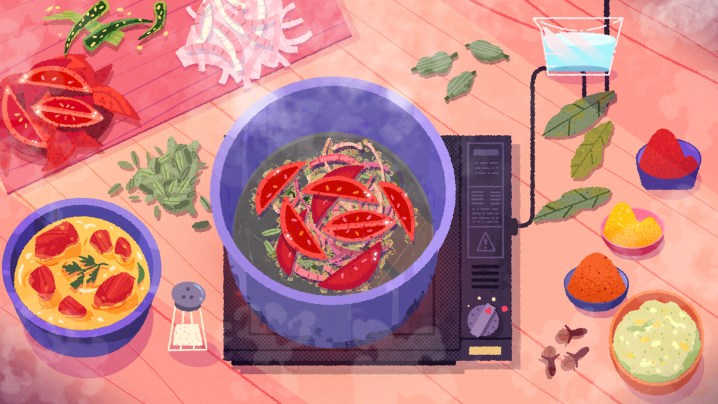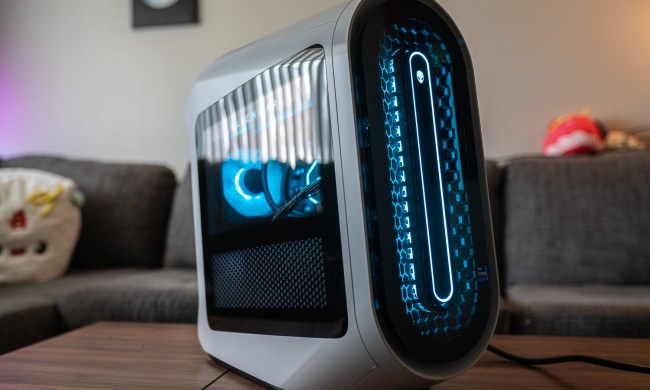
“Venba delivers an elegantly nuanced story about cultural identity through sharply written dialogue and meaningful cooking interludes.”
- Nuanced, sincere story
- Not a wasted moment
- Vibrant art style
- Detailed sound design
- Meaningful cooking interludes
- Some arcs feel abridged
In Venba, South Indian recipes become tasty logic puzzles as I work out missing steps from a tattered cookbook. But there’s a more complex problem at the heart of the narrative indie that’s not so easy to solve.
Venba and her husband Paavalan have emigrated from India to Canada in search of a new life – a goal that’s quickly complicated by the unexpected arrival of a third family member. In addition to dealing with financial insecurity, Venba finds herself struggling to connect with her son Kavin, who drifts further away from her Tamil roots with each passing year. It’s not as simple as making idlis; there isn’t a step-by-step guide that explains how to hold on to your child without smothering them.
That grounded conflict is the key ingredient in Venba’s powerful — but not overpowering — story, which unfolds both through sharply written visual novel segments and delectable cooking interludes that’ll leave your mouth watering. Not a single moment goes wasted in this perfectly seasoned indie about one mother’s attempt to preserve her family’s cultural identity and a son struggling to fit that into his own.
Economical storytelling
Though Venba’s story sounds sprawling on paper, documenting its central family over four decades, its success comes in its restraint. The quiet saga unfolds over seven bite-sized chapters that give a slice-of-life look into each of its characters’ lives and their evolving relationships with one another. Though that compact structure leaves a few character beats feeling a little truncated, every second of its visual novel sequences is densely packed with detail.
Within its first few minutes, set in 1988 before Kavin’s birth, we get a full picture of both Venba and Paavalan. The scene opens with a nauseous Venba struggling to get out the door to her teaching job. Paavalan convinces her to call out sick as he rushes off to his own part-time gig without eating. Sensing her husband’s inability to take care of himself, Venba gets up to make some idlis for the two of them, using her mother’s torn-up cookbook. The two share a quick meal while debating whether or not they have enough time and money to visit their families in South India.
It’s an elegantly crafted sequence, establishing more in five minutes than most games do in five hours. There’s a sense of financial urgency as both characters are hesitant to miss a second of work. We learn about Venba’s close relationship with her family and life back in South India, one that’s deteriorating like her mom’s cookbook. Most subtle of all is Paavalan’s development, as his breakfast-skipping tendencies signal a much more serious self-care issue. Each of those threads is fully explored by the end, unraveling in subtle ways that become more apparent the more I revisit scenes.

The story really gets cooking in its second chapter, as we flash forward into the 90s. Now raising their young son Kavin, the couple’s anxieties only deepen. Paavalan still struggles to land full-time employment, further fueling his quiet deterioration, and Venba’s fears of losing touch with her Tamil roots become tangible in her quickly acclimating, Canada-born son. When Kavin tells his parents that he yet again wants pizza for dinner instead of homemade Indian food, I can feel Venba’s heart sink. She has to trick him into making her mother’s puttu recipe with her instead by convincing him that it’s like building a rocket ship. It’s a cute parenting moment, but a trick she’s unable to repeat the older he gets.
The tension is baked into even the smallest details. When Venba speaks in Tamil, it’s represented by a clear text bubble that steadily fills with her words. It’s clear and easy to follow. That stands in sharp contrast to how English dialogue is shown. When Kavin speaks on the phone in English, the text speed doubles and the bubble itself is blotchy, with stains obscuring some words. It’s a beautifully understated way to mirror Venba’s pain, as she loses the ability to understand her son the more he rejects a heritage that means so much to her.
It all makes for an honest, heartfelt story that expertly pays off several thematic threads in just over an hour.
Venba’s story shines a light on specific cultural issues Tamil people face outside of their home country. In a poignant moment, a grown-up Kavin fights with a movie producer about the way a Tamil student should be represented in a school cafeteria scene. The producer wants to show her happily eating something like “spicy vindaloo” alongside other students. Kavin briefly types out a text response explaining why that rings false, explaining the embarrassment he felt as a kid when bringing his home-cooked lunch to school. It’s a raw moment of self-reflection — one he has to begrudgingly delete if he wants to keep his job.
The moving narrative is full of soft gut punches like that, solemnly exploring the challenges that South Indians often face down to even the smallest microaggressions. Through that struggle, though, Venba builds to a deeply nuanced conclusion that sees a mother and son finding a way to embrace one another’s complicated feelings about their heritage. It all makes for an honest, heartfelt story that expertly pays off several thematic threads in just over an hour.
Cultural appreciation
Though Kavin may try to hide his roots, the developers at Visai Games wear them proudly. Venba is a colorful celebration of Tamil culture, complete with period-appropriate music in each chapter and a colorful art style that makes every South Indian object and outfit pop. The real star here, though, is its cuisine, every piece of which serves a deeper narrative purpose beyond the interactive cooking games they bring to the table. A simple nattu kozhi kulambu (“that’s like a chicken soup I think,” Kavin says) sequence turns into a pivotal moment that helps Kavin reconnect with his mother.
I can feel and hear each dish, giving me a newfound respect for what goes into making them.
Venba’s cooking scenes play out as quick puzzles, where players need to successfully create a dish using smudged cookbook pages that obscure some steps. When Venba makes puttu, her cookbook shows a tower of alternating ingredients that need to be placed in the right order. Unfortunately, the actual ingredient names are smudged out. Correctly assembling it requires a bit of logic, pushing players to understand why South Indian dishes are assembled the way they are. That logic carries over to later recipes too; an observation about the way tomatoes release their juices helps me figure out an entirely lost recipe later.
Each dish is brought to life as authentically as possible, as Visai Games goes to great lengths to recreate foods in Venba’s vibrant art style. Even the cooking sounds are properly captured here, with realistic sizzles recorded straight from real-world pans. Those details put me in Venba’s kitchen, making her close connection with every meal she creates more tangible. I can feel and hear each dish, giving me a newfound respect for what goes into making them.

Though it’s centered around the Tamil experience, I found myself unpacking some familiar feelings long after playing. I’ve always had a complicated relationship with my father, an Italian immigrant who held on tightly to his heritage even as he worked to acclimate to “American” ideals. I wanted nothing more than to distance myself from his background growing up, refusing to learn Italian or shadow him while he cooked. The older I’ve grown, though, the more I regret pushing back on that piece of my cultural identity. I find myself wanting to visit home so he can show me how to properly make coppa and salami. It’s something I’ve been too embarrassed to admit to him in recent years. I can see us in Venba and Kavin, even if our backgrounds are very different.
That’s what makes Venba such a powerful work of interactive fiction. It’s at once an empathetic dissection of a specific Tamil experience and a universal story about embracing our own, and one other’s, unique cultural identities. It’s that mix of ingredients that gives our world flavor.
Venba was tested on a Nintendo Switch OLED in handheld mode and on a TCL 6-Series R635 when docked.




